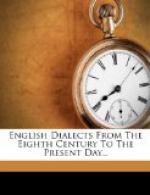There are also a few Charters extant in the Mercian dialect, but the earliest contain little else than old forms of the names of persons and places. There are, however, some later Charters, from 836 to 1058 in the Mercian dialect, which contain some boundaries of lands and afford other information. Most of these relate to Worcestershire.
But the most interesting Mercian glosses are those to be found in the Rushworth MS., which has already been mentioned as containing Northumbrian glosses of the Latin Gospels of St Mark, St Luke, and St John. For the Gospel of St Matthew was glossed by the scribe Farman, who was a priest of Harewood, situate on the river Wharfe, in the West Riding of Yorkshire; whose language, accordingly, was Mercian. In my Principles of English Etymology, First Series (second edition, 1892), p. 44, I gave a list of words selected from these glosses, in order to show how much nearer they stand, as a rule, to modern English than do the corresponding Anglo-Saxon forms. I here repeat this list, as it is very instructive. The references, such as “5. 15,” are to the chapters and verses of St Matthew’s Gospel, as printed in my edition of The Holy Gospels, in Anglo-Saxon, Northumbrian, and Old Mercian Versions, synoptically arranged (Cambridge, 1871-87). The first column below gives the Modern English form, the second the Old Mercian form (with references), and the third the Anglo-Saxon or Wessex form:
MODERN OLD MERCIAN WESSEX (A.S.)
all all, 5. 15 eall
are arun, 19. 28 (not used)
betwixt betwix, 27. 56 betweox
cheek c{-e}ke, 5. 39 c{-e}ace
5 cold cald, 10. 42 ceald
eke {-e}k, 5. 39 {-e}ac
eleven enlefan, 28. 16 endlufon
eye {-e}ge, 5. 29 {-e}age
falleth falleth, 10. 29 fealleth
10 fell, pt.t.pl. fellun, 7. 25 f{-e}ollon
-fold -fald, 19. 29 -feald
(in ten-fold)
gall, sb. galla, 27. 34 gealla
half, sb. half, 20. 23 healf
halt, adj. halt, 11. 5 healt
15 heard, pt.t.s. (ge)h{-e}rde, 2. 3 (ge)h{-i}erde
lie l{-i}gan, 5. 11 l{-e}ogan
(tell lies)
light, sb. l{-i}ht, 5. 16 l{-e}oht
light, adj. liht, 11. 30 leoht
narrow naru, 7. 14 nearu
20 old {’a}ld, 9. 16 eald
sheep sc{-e}p, 25. 32 sc{-e}ap
shoes sc{-o}as, 10. 10 sc{-e}os, sc{-y}
silver sylfur, 10. 9 seolfor
slept, pt.t.pl. sleptun, 13. 25 sl{-e}pon
25 sold, pp. sald, 10. 19 seald
spit, vb. spittan, 27. 30 sp{-{ae}}tan
wall wall, 21. 33 weall
yard (rod) ierd, 10. 10 gyrd
yare (ready) iara, 22. 4 gearo
30 yoke ioc, 11. 29 geoc
youth iuguth, 19. 20 geoguth
In l.5, the scribe Farman miswrote caldas as galdas, in Matt. x 42; but it is a mere mistake. In l. 20, the accent over the a in _{’a}ld_ is marked in the MS., though the vowel was not originally long.




